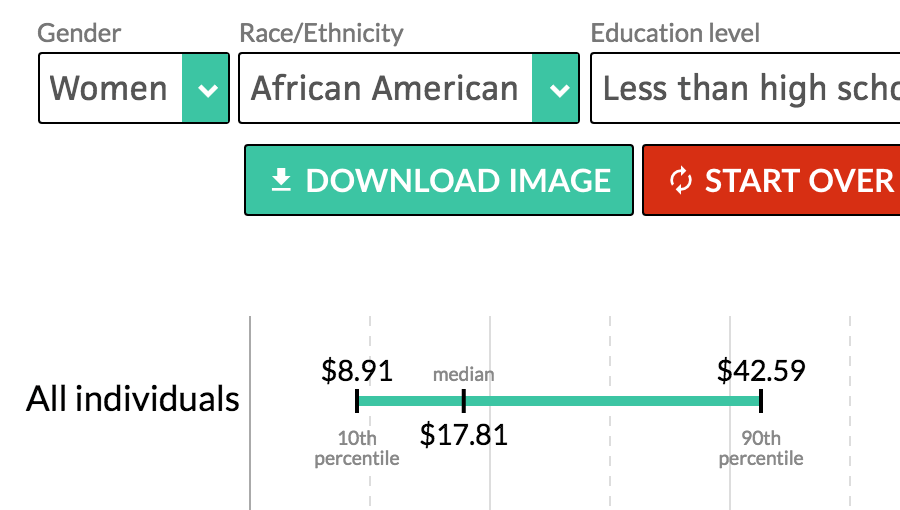Brad DeLong: Worthy reads on equitable growth, July 12–18, 2019
Worthy reads from Equitable Growth:
- The most important worthy read this week is Fiona Scott Morton’s “Modern U.S. Antitrust Theory and Evidence Amid Rising Concerns Of Market Power and Its Effects: An Overview Of Recent Academic Literature,” in which she writes: “The experiment of enforcing the antitrust laws a little bit less each year has run for 40 years, and scholars are now in a position to assess the evidence. The accompanying interactive database of research papers for the first time assembles in one place the most recent economic literature bearing on antitrust enforcement … Horizontal mergers … Vertical mergers … Exclusionary conduct … Loyalty rebates … Most Favored Nation clause … Predation … Common ownership … Monopsony power … Macroeconomics and market power.”
- Watch Darrick Hamilton, “Racial and Gender Wage Gaps,” from this event on Capitol Hill, “Racial and Gender Wage Gaps: Overcoming Structural Barriers to Shared Growth.”
- Read Korin Davis, “Equitable Growth Launches Quarterly Working Paper Digest,” in which she notes: “The Equitable Growth Working Paper Digest provides descriptions of several highlighted working papers along with analysis by our staff of why they are significant and how they fit into the framework of Equitable Growth’s efforts.”
- And then read Kyle Herkenhoff, “The Case for More Internships and Apprenticeships in the United States,” in which he writes: “We estimate that learning from co-workers accounts for 24 percent of the aggregate U.S. human capital stock. Roughly 40 percent of a typical worker’s human capital is accumulated on the job, and of that human capital accumulation, 60 percent comes from learning the skills of co-workers. These benefits of learning from co-workers could be increased markedly.”
Worthy reads not from Equitable Growth:
- A healthy macroeconomy continues to be the best of all labor-side policies. Two centuries of bitter experience have taught us that the macroeconomy can only stay healthy if it is planned—and properly planned. Not least among the necessary planning institutions for the macroeconomy is the central bank. And two centuries of bitter experience have taught us that the central bank has a very delicate task, one that can only be successfully accomplished if it is staffed by highly competent and good-hearted people. Here, we have the American Enterprise Institute raising the alarm with respect to the chaos-monkey nature of President Donald Trump’s Federal Reserve nominations. Read Desmond Lachlan, “Trump’s bizarre Federal Reserve nomination,” in which he writes: “Among President Trump’s more bizarre nominations for office has to be his nomination of Judy Shelton … Shelton manages to hold two contradictory views of monetary policy at the same time … Normally a person would be in favor of either an easy monetary policy to stimulate the economy or a hard monetary policy to exert discipline on the government … One would not expect her to hold both views at the same time. Yet Ms. Shelton does exactly that.”
- The past decade of bitter experience has taught us that monetary policy cannot do the entire job on its own: A healthy macroeconomy requires planning, and some of that planning must be on the fiscal policy side. And the evidence that expansionary fiscal policy is a very effective tool to cure a depressed economy, and cure it with minimal blowback costs of any kind, continues to mount. Read Jérémie Cohen-Setton, Egor Gornostay, and Colombe Ladreit de Lacharrière, “Aggregate Effects of Budget Stimulus: Evidence from the Large Fiscal Expansions Database,” in which they write: “This paper estimates the effects of fiscal stimulus on economic activity using a novel database on large fiscal expansions for 17 OECD countries for the period 1960–2006. The database is constructed by combining the statistical approach to identifying large shifts in fiscal policy with narrative evidence from contemporaneous policy documents. When correctly identified, large fiscal stimulus packages are found to have strong and persistent expansionary effects on economic activity, with a multiplier of 1 or above. The effects of stimulus are largest in slumps and smallest in booms.”
- Very wise. There is no reason for the U.S. Senate to do anything but neglect the Federal Reserve, and the Fed will be stronger at the start of 2021 if it is neglected. Read Josh Barro, “There’s No Need for the Senate to Confirm Anyone to the Fed,” in which he writes: “Trump … says he will nominate Judy Shelton and Christopher Waller to … fill out the board … Moore and Cain were bizarre … Waller seems like a fine enough choice … Shelton … like Cain and Moore before her has traded in a long track record of hawkish gold-buggery for a new, dovish outlook that calls for the low interest rates President Trump wants … Shelton’s flip-flop is, if anything, more egregious than Moore’s and Cain’s, because monetary policy is supposed to be an actual area of expertise for her … Conservatives in the Senate have reasons to take a long view … So long as Trump is the person making nominations, there’s no reason to aim for seven.”
- Market forces are voting, strongly, for green energy. Read Alwyn Scott, “General Electric to Scrap California Power Plant 20 Years Early,” in which he reports: “General Electric Co. said on Friday it plans to demolish a large power plant it owns in California this year after only one-third of its useful life because the plant is no longer economically viable in a state where wind and solar supply a growing share of inexpensive electricity. The 750-megawatt natural-gas-fired plant, known as the Inland Empire Energy Center, uses two of GE’s H-Class turbines, developed only in the last decade, before the company’s successor gas turbine, the flagship HA model, which uses different technology. The closure illustrates stiff competition in the deregulated energy market as cheap wind and solar supply more electricity, squeezing out fossil fuels.”



